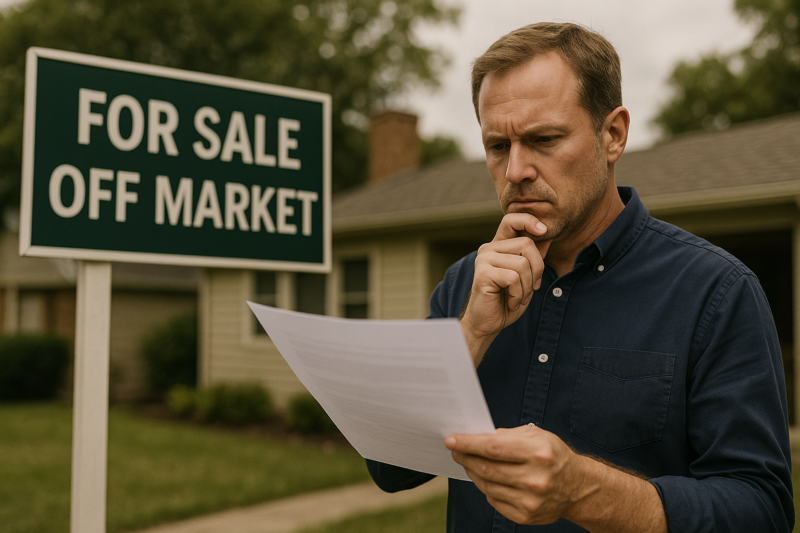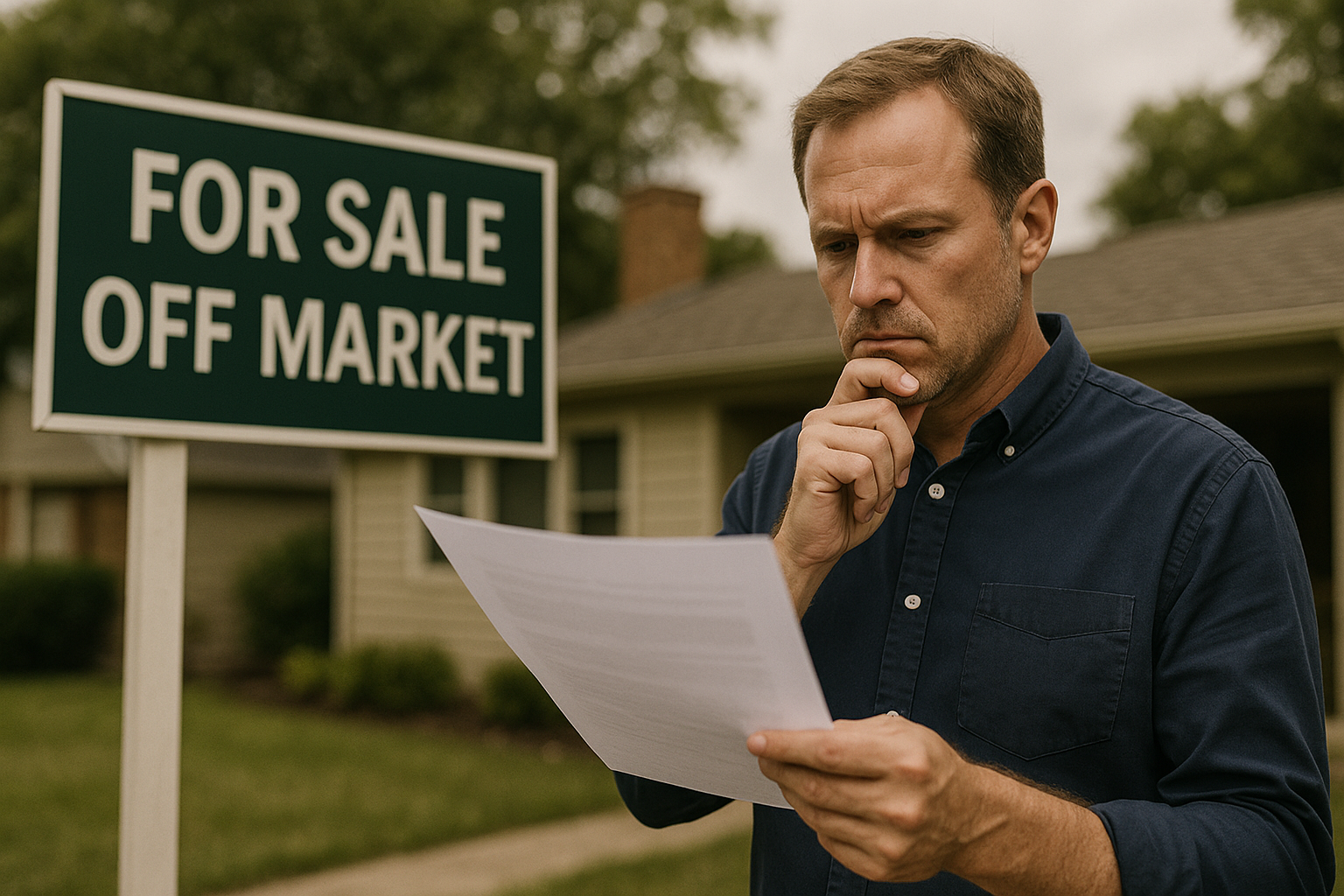The idea of finding a hidden gem in the property market is alluring.
Off-market properties – whispered about in investor circles in social media and touted by some buyers’ agents as their secret weapon – seem like the ultimate insider advantage.
But are they really the golden ticket they’re made out to be, or is the reality a little less glamorous?
Let’s pull back the curtain on off-market properties and see what’s really going on.

What is an off-market property?
An off-market property is, as the name suggests, a property that isn’t publicly advertised on mainstream platforms like Domain or Realestate.com.au.
There are no open homes, no glossy ads, and no big social media campaigns.
Instead, these properties are sold privately – often through an agent’s network or occasionally directly by the owner.
It all sounds exclusive and a little mysterious, right?
I’ve recently read a surprising estimate that up to 20% of properties are sold off-market.
That’s a sizable chunk, but it doesn’t mean they’re all bargains waiting for you to scoop them up.
In fact, most of these so-called off-market properties aren’t genuinely off-market at all.
Many are pre-market properties that agents are quietly showing to a handful of buyers before launching a full public campaign.
And there are even websites that promote themselves as having only off-market properties for sale – go figure?
Why do vendors sell off-market?
There are a few reasons why a seller might avoid going public:
- To avoid marketing costs: Advertising, professional photography, staging – these all cost money. Some vendors skip them to save a few dollars. By the way, I think that’s a mistake.
- Time sensitivity: Maybe the seller needs a quick sale and doesn’t have time for the usual marketing lead-up.
- Privacy: Some owners, especially high-profile individuals, prefer to keep the sale low-key.
But here’s the question savvy investors should ask: If this property is such a great deal, why wouldn’t the vendor expose it to the full market to attract more buyers and potentially a higher price?
Clearly, if a property is priced attractively, it’s in the vendor’s best interest to list it publicly and create competition.
The pitfalls of off-market properties for investors
So, should you chase these elusive deals? Here are some reasons to tread carefully:
1. Why Would a Vendor Sell Below Market Value?
The idea that vendors will accept a lower price to avoid marketing costs is wishful thinking.
Most sellers are well aware of current property values and aren’t in such a rush that they’ll leave tens of thousands of dollars on the table.
Off-market properties are often used to test the waters and see if there’s interest at a certain price. If they don’t get the offers they’re hoping for, the property will probably hit the open market anyway.
2. Your Offer May Be Used as a Benchmark
Think you’re getting a sneak peek? Maybe.
But sometimes, agents use your offer to gauge demand and set the price for the public listing.
Your "exclusive" opportunity could simply be helping the agent sharpen their pricing strategy.
3. The Property May Still Go Public
Even if you make an offer, there’s no guarantee the vendor will accept it.
If they think they can get more interest by listing publicly, they will – and you could end up competing against the broader market anyway.
4. You’re Not Really Avoiding Competition
Many buyers assume off-market means no competition. But these properties are typically shown to multiple buyers or buyers’ agents simultaneously.
So, instead of competing with the public, you’re competing with a smaller but equally motivated group.
Are buyers’ agents overhyping off-market deals?
Here’s a critical observation: some buyers’ agents use access to off-market properties as a key selling point to win new clients.
They frame it as if they’re opening doors to secret listings you could never find yourself.
But the truth is, most of these aren’t genuinely off-market. As I said, they’re pre-market.
Many of these are properties that will soon hit the public listings, but agents offer them early to see if they can secure a fast, clean sale.
There’s nothing wrong with this approach, but as an investor, it’s important not to get caught up in the hype.
The mere fact that a property is off the market doesn’t automatically make it a great buy.
When off-market properties might make sense
That’s not to say you should ignore off-market opportunities completely.
In fact, at Metropole, our team of buyer's agents buy many such properties.
Some situations where we consider off market properties are: , they can be worthwhile:
- Exclusivity: In tightly held markets with limited stock, relationships with agents can provide us with access to properties that others may never see.
- Motivated vendors: If a seller genuinely needs a quick sale and wer’e in the right place at the right time, there may be room for negotiation.
- Privacy-driven sellers: High-end properties where owners want discretion may only ever be offered off-market.
But even then, we always run the numbers carefully and make sure the deal stacks up.
Tips for smart investors
So, how do you find great investment properties – on or off the market?
- Know your numbers: Due diligence is non-negotiable. Never let the "exclusivity" of an off-market listing cloud your judgment.
- Build relationships: Agents are more likely to show you pre-market opportunities if they know you’re a serious buyer. That’s where the buyers agent team at Metropole you’re in the marketplace every day have an edge.
- Stay market-aware: Understand local trends, comparable sales, and rental yields so you can quickly identify if a property is overvalued.
- Don’t chase deals for the sake of it: A bad property at a so-called "exclusive" price is still a bad property.
The bottom line
Off-market properties sound sexy – secret listings, fewer competitors, first dibs.
But for most investors, the reality is far less exciting. Often these deals aren’t off-market at all; they’re just pre-market – and there’s no guarantee of a bargain.
The key to successful investing isn’t finding properties no one else knows about; it’s buying the right property at the right price, with a focus on long-term growth potential, not short-term exclusivity.
In property, as in life, if it sounds too good to be true, it probably is.














